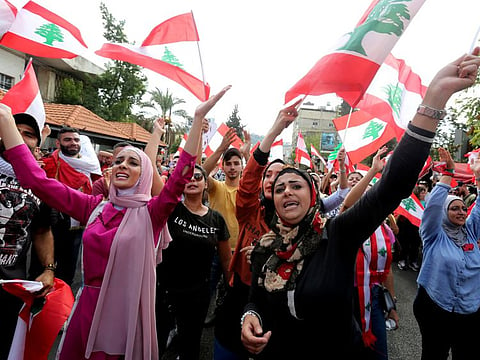Lebanese PM Hariri agrees to a package of reforms to end crisis, in concession to massive protests
Lebanese PM struggles fix economy; agrees to raft of reforms including privatisation

Lebanon PM Hariri agrees reform package in bid to resolve economic crisis -official sources tell Reuters
BEIRUT: Lebanon's Prime Minister Saad Al-Hariri has agreed to a package of reforms with government partners to ease an economic crisis that has sparked nationwide protests, official sources told Reuters, with a Cabinet meeting expected on Monday to approve them.
Widespread protests were triggered in part by a government decision last week to put a levy on WhatsApp calls. Lebanon has been hit by several days of protests ever since.
The following are the key proposed reforms to be presented to Cabinet on Monday:
On Sunday night, protesters have declared on Twitter that tomorrow, Monday (October 21, 2019) will commence a "general strike" all over Lebanon.
A cabinet meeting is expected on Monday to approve the proposed reforms.
Rivalries
Hariri, who is leading a coalition government mired by sectarian and political rivalries, gave his feuding government partners a 72-hour deadline on Friday to agree to reforms that could ward off crisis, hinting he may otherwise resign.
It includes a plan to privatise its telecommunications sector and an overhaul to its crippled electricity sector, a crucial demand among potential foreign donors and investors needed to unlock some $11 billion in funds to Lebanon.
Levy on WhatApp calls
The sources said the budget would not include any additional taxes or fees amid widespread unrest that were triggered in part by a decision last week to put a levy on WhatsApp calls.
The reforms also called for establishing new regulatory and transparency bodies within a "short period" of time to oversee reform plans.
Central to protester demands is an end to what they say is rampant corruption destroying the economy.
Earlier report:
Lebanese Prime Minister Saad Hariri, whose government is facing unprecedented protests, has proposed a series of steps aimed at revitalizing the country’s battered economy and placate angry demonstrators.
Hariri’s 24-point blueprint proposes scrapping taxes on public services, reinstating cuts in salaries of retired military personnel and privatising the mobile phone sector.
The proposals also feature cuts in the salaries of the government ministers and lawmakers by 50 per cent, setting a ceiling for the pay received by committee’s members, executives, the judiciaries, and the active military.
The blueprint, according to Al Arabiya television, also envisages a 25 per cent tax on banks and insurance firms operating in Lebanon.
A maximum allowance of $3,000 is proposed for any state mission abroad.
In an apparent attempt to fight corruption, the blueprint also suggests that any tender valued at more than $25,000 must be approved in advance by the Accountancy and Inspection Department.
Hariri’s economic formula also calls for hiking taxes on imports in a bid to protect local industries, and financial support from banks to set up power and recycling plants.
In recent years, Lebanon has suffered an acute power shortages and problems in garbage disposal.
On Friday, Hariri gave his partners in the government 72 hours to back reforms he said are necessary to rejuvenate the debt-ridden economy.
The deadline was made amid street protests against his government’s austerity policies and corruption of the political class.
(With inputs from Reuters)
Sign up for the Daily Briefing
Get the latest news and updates straight to your inbox



